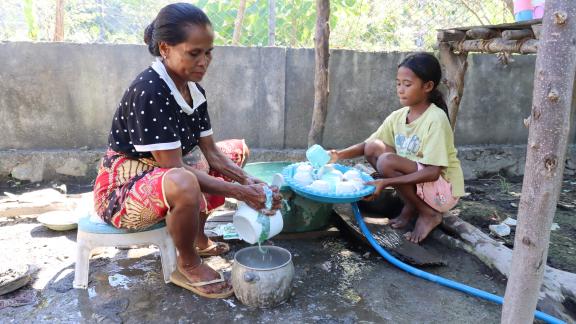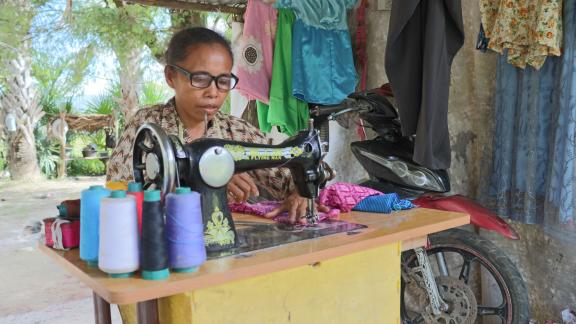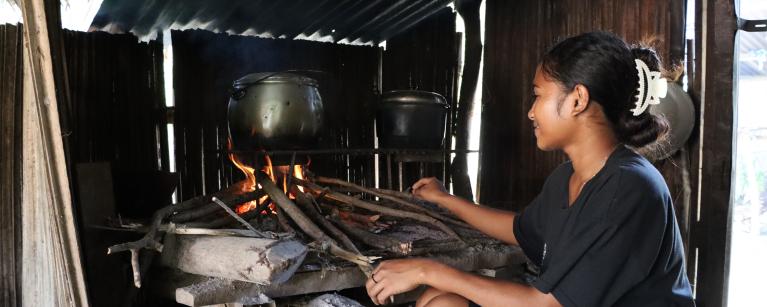In Timor-Leste, women carry a heavy and often invisible burden. Every day, they take on essential responsibilities such as cooking, cleaning, raising children, and caring for the sick, elderly, and people with disabilities (PwDs). On average, a woman in Timor-Leste spends 57 hours per week on care work alone (Oxfam, 2022). Despite this enormous contribution, their labour is unpaid and treated as a family obligation—rooted in love—rather than as valuable work. This raises an important question: what do women actually receive in return for this critical, yet unrecognized, labour?
Too often, the answer is clear:
- Women’s work is unvalued or undervalued by society.
- Their contributions are not formally recognized.
- They are considered dependent rather than independent contributors.
Unpaid care work is not simply a private family matter. It is an issue of inequality and a broader social problem—one that too often goes unquestioned. Some might argue: Why is this a problem for everyone? Isn’t it enough that chores are done, and women are willing to perform them?
The truth is, it is not okay.
First, our society largely assumes that care work is inherently women’s work and requires no specific skill set. As a result, the value of this labour is minimized. This perception extends to the paid labour sector—particularly domestic workers—who often work the longest hours, waking before their employers and resting only after the household has gone to sleep, yet earning some of the lowest wages.
Second, the burden of unpaid care work is not shared equally. Women in rural areas, where access to healthcare services, roads, electricity, and clean water is limited, face far greater challenges than women in urban areas with better infrastructure. Similarly, women from poorer households’ shoulder heavier burdens compared to women from wealthier families. This inequality often trickles down to the next generation, with daughters carrying out tasks such as fetching water, collecting firewood, and caring for younger siblings—sacrificing their own time for education and play.
Third, unpaid care work keeps many women out of the paid labour force. With most of their time consumed by unpaid household responsibilities, they have little opportunity to seek employment. According to the International Labour Organization (ILO - 2018), 606 million working-age women worldwide are unable to join the labour market due to the heavy burden of unpaid care work.
For Timor-Leste, this issue goes beyond gender inequality—it has serious implications for national development. Unpaid care work not only restricts women’s opportunities but also hinders the economic potential of the country as a whole.
Solutions are possible. Expanding access to basic infrastructure—such as water systems, electricity, and healthcare—can significantly reduce the time women spend on unpaid tasks. Affordable care services can also provide much-needed support for families with limited resources. Most importantly, shifting social norms and encouraging men to share unpaid care responsibilities is vital. As the saying goes, “Sharing is Caring.” When men and women share the responsibilities of care, families thrive, and society as a whole moves toward greater equality and harmony.

Pezu invizível hosi serbisu kuidadu nian ne'ebé la selu iha Timor-Leste
Iha Timor-Leste, feto dalabarak hetan presaun ho knaar ida ne’ebé todan no dala barak la hetan rekoñesimentu. Loron-loron, feto foti responsabilidade esensiál sira hanesan tein, hamoos, hare-labarik, no tau matan ba ema moras, katuas-ferik sira, no ema ho defisiénsia (PwDs). Tuir médium, kada feto ida iha Timor-Leste gasta oras 57 kada semana ba serbisu kuidadu mesak (Oxfam, 2022). Maski kontribuisaun boot ida-ne'e, sira nia serbisu la hetan selu no trata hanesan obrigasaun família nian—ne'ebé haree hanesan abut ba domin—duké hanesan serbisu ne'ebé iha valór. Ida-ne'e hamosu pergunta importante ida katak: saida maka feto sira simu ba serbisu krítiku ida ne’e, ne'ebé la hetan rekoñesimentu?
Dala barak liu, resposta klaru, katak:
1. Feto sira-nia serbisu la hetan valór ka subvalorizasaun hosi sosiedade.
2. Sira-nia kontribuisaun la hetan rekoñesimentu formál.
3. Sira konsidera hanesan kontribuinte dependente duké independente.
Serbisu kuidadu nian ne'ebé la selu la'ós de'it asuntu privadu família nian. Ida-ne'e hanesan kestaun dezigualdade no problema sosiál ida ne'ebé bo’ot tebes—no ida ne'e dala barak ita la kestiona. Ema balu bele argumenta: Tanbasá mak ida-neʼe sai problema ba ema hotu? La to'o katak serbisu uma-laran nian halo hotu ona, no feto sira prontu atu hala'o servisu sira ne’e?
Tuir lolos ne’e, ida-ne'e ladún di'ak.
Dahuluk, ita-nia sosiedade barak liu asume katak serbisu kuidadu nian maka feto nia serbisu no la presiza abilidade espesífiku. Entaun husi rezultadu ida ne’e, valór serbisu kuidadu nian minimiza. Persesaun ida-ne'e extende ba to’o iha setór serbisu ho saláriu—partikularmente traballadór doméstiku sira—ne'ebé dala barak serbisu oras barak liu, hadeer antes sira nia empregadór hader no deskansa de'it hafoin uma-nain sira toba, maibé hetan saláriu ki'ik liu.
Daruak, todan husi serbisu kuidadu nian ne'ebé la selu la fahe hanesan. Feto sira iha área rurál sira, ne'ebé presiza asesu ba servisu kuidadu saúde nian, estrada, eletrisidade, no bee-moos limitadu tebes, tamba ida ne’e dezafiu sira ne'e boot liu ba feto rurál duké feto iha área urbana ho infraestrutura ne'ebé di'ak liu. Nune'e mós, feto sira hosi umakain ne'ebé moris ladun di’ak, nia kabas todan liu kompara ho feto sira hosi família moris di’ak sira. Dezigualdade ida-ne'e dala barak kontinua ba jerasaun tuirmai, ho oan-feto sira ne'ebé hala'o knaar sira hanesan kuru bee, hili ai-sunu, no tau matan ba alin sira ne'ebé tinan ki'ik—sakrifika sira nia tempu ba edukasaun no halimar.
Datoluk, serbisu kuidadu nian ne'ebé la selu afeta feto barak hodi sai hosi forsa traballu selu nian. Gasta sira nia tempu barak liu hodi foti responsabilidade uma-laran nian ne'ebé la selu, sira iha oportunidade uitoan de'it atu buka serbisu. Tuir Organizasaun Internasionál Traballu (ILO - 2018), feto ho idade serbisu hamutuk millaun 606 iha mundu tomak la tama iha merkadu traballu tanba hetan presaun hosi serbisu kuidadu nian ne'ebé la selu.
Ba Timor-Leste, kestaun ida-ne’e la’os de’it kona-ba dezigualdade jéneru—maibe ida ne’e mos iha implikasaun sériu ba dezenvolvimentu nasionál. Serbisu kuidadu nian ne'ebé la selu la'ós de'it taka oportunidade ba feto, maibé mós difikulta potensiál ekonómiku nasaun tomak nian.
Solusaun sira posivel. Habelar asesu ba infraestrutura báziku—hanesan asesu ba bee-moos, eletrisidade, no fasilidade saúde sira—bele hamenus signifikativamente tempu ne'ebé feto sira gasta ba knaar kuidadu ne'ebé la hetan selu. Fasilidade kuidadu ne'ebé baratu sei apoiu tebes ba família sira ho rekursu limitadu ne'ebé presiza. Importante liu, muda norma sosiál sira no enkoraja mane sira atu fahe responsabilidade kuidadu nian ne'ebé la selu maka importante tebes. Hanesan liafuan ida dehan, "Fahe ne’e tamba Hadomi." Bainhira mane no feto sira fahe responsabilidade servisu kuidadu nian, família sira buras, no sosiedade hakat ba igualdade no armonia ne'ebé di’akliu.

